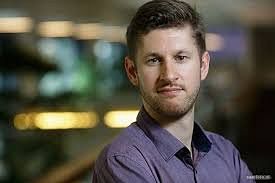TU Delft PhD candidate Rolf van Wegberg has been elected as the new president of the PhD candidates Network of the Netherlands (PNN). He would like to see more attention paid to the way in which PhD candidates are appointed.
Congratulations on your presidency. You said in a press release that you consider lobbying is desperately needed at the moment. Why?
“For three reasons. One reason is the experiment with PhD candidates in Groningen and Rotterdam. There the PhD candidate is not an employee but a student. That’s a disguised cutback. When you study for a PhD, we consider that to be employment, because you are supervised within a hierarchy. According to the Dutch Tax and Customs Administration, there is fictitious employment. The second reason is the ius promovendi – the right of professors to allow researchers to obtain a doctorate. The Dutch House of Representatives is currently considering a legal proposal to extend this to associate professors as an exception.”
Do you think this is a good idea?
“Before you can answer that, the question is: where does this idea come from? In our view, it comes from the idea that there are too many PhD candidates and that something has to be done about the number of promotors. If associate professors can also grant doctoral degrees, there is immediately additional scope for more PhD candidates. How do we prevent a PhD production line? The proposal could be at the expense of PhD quality.”
But that doesn’t have to be the case?
“It doesn’t have to be, but we would like to hear in more detail what the minister’s arguments are and how the various universities’ boards for doctorates can apply the exception. The third point is career development. As there are now so many PhD candidates, they don’t all remain at university. For precisely this reason, great attention needs to be paid to career development. Currently too little attention is being paid and for this reason, we have set up a Professional PhD Programme. During their PhD, we connect PhD candidates who wish to gain work experience outside the university with companies and organisations for three to six months. In fact, we feel that this falls within the mandate of the graduate schools.”
What else would you like to focus on?
“On the way in which PhD candidates are currently appointed at universities. The PhD student is a visible and obvious example of how it should not be done. A hidden problem is that fellows from outside the European Union sometimes have insufficient income due to the exchange rate with their home country. Sometimes, university institutions have to contribute funds to cover the income gap. That’s one hidden problem.”
In your opinion what other problems are there?
“There are more people who would like to obtain a PhD than there is a place for. Then you have the situation that people accept inappropriate appointments. For example, you might accept an appointment for two or three years instead of the usual four years. Often the funding is also fragmented: you scrape a bit together from pot A, pot B and pot C and so cobble together a PhD position. I encourage PhD candidates who find themselves in such a situation to contact their promotors or their graduate schools, or otherwise to contact us. A student in Tilburg even resorted to crowdfunding to create a place.”
What is your own PhD research about?
“It’s about cybercrime aimed at financial gain and financial institutions. I studied criminology in Leiden and conducted research at TU Delft mainly on criminal strategies. For example, I try to unravel how criminals use bitcoins to launder money earned through cybercrime.”
What are you own experiences of TU Delft’s graduate school?
“It’s going well. Of course that’s only my opinion, but from PhD candidate networks at other universities I hear that TU Delft is often cited as an example of good practice for how graduate schools should operate and how candidates should be supervised.”



Comments are closed.